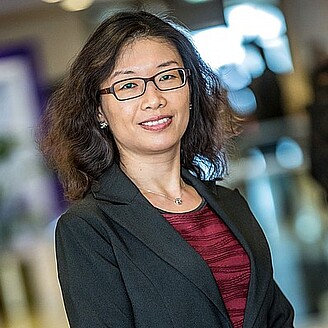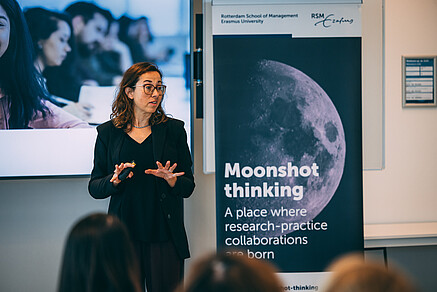BIM research is driven by five focal areas:
BIM’s digital strategy research focuses on understanding the strategic use of information, information systems and information technology. We also examine how these affect consumer behaviour and competitive business strategy.
Faculty members working in this area include: Dr Dominik Gutt, Dr Ting Li, Dr Martin Quinn and Dr Dimitrios Tsekouras.
PhD students working in this area include: Tamara Thuis and Marilu Miotto.
Our data science research evaluates how organisations can use advanced data analysis techniques and technologies to gather insights, improve decision-making, streamline operations and gain a competitive edge.
Faculty members working on how to best use data from new technologies include: Dr Philipp Cornelius, Dr Otto Koppius, Dr Tayfun Kucukyilmaz, Dr Sameer Mehta and Dr Yagmur Ozdemir.
The PhD student researching this area is: Charles Wan.
By researching digital platforms, we can look deeper into how businesses use online systems and tools to enhance their operations, improve customer engagement, streamline processes and drive innovation.
We examine how these platforms impact business performance, the strategies for effective implementation and the ways in which the platforms facilitate data management, communication and collaboration within and between organisations.
Faculty members working on this include: Dr Jovana Karanovic, Dr Sameer Mehta, Dr Anna Priante, Dr Olga Silvko and Dr Dainis Zegners.
The PhD student researching this area is: Wei Wang
With BIM’s research on digital technology and social impact in business information management, we analyse how digital tools and innovations influence societal outcomes and ethical considerations in business practices.
Additionally, we explore how businesses use technology to address social issues, enhance corporate social responsibility and contribute to sustainable development. This research also looks at the ways digital technology can affect employee well-being, consumer behaviour and community engagement, with an aim to balance profitability with positive social impact.
Faculty members working in this area include: Prof. Eric van Heck, Dr Jovana Karanovic, Prof. Ting Li, Dr Anna Priante, Prof. Dr Jeffrey Sweeney, and Dr Dimitrios Tsekouras.
PhD students researching this area include: Marilu Miotto and Agnieszka Kloc.
In this area, we explore how businesses can optimise energy resources whilst promoting sustainable practices. Here, we examine strategies for how to integrate renewable energy sources, improve energy efficiency and reduce environmental impact.
This research area also looks at how market dynamics, regulatory frameworks and technological innovations influence business decisions and operations in the energy sector, with an aim to achieve balance between economic growth and environmental responsibility.
Faculty members working in this area include: Dr Yashar Ghiassi-Farrokhfal, Prof. Eric van Heck and Dr Sameer Mehta.
PhD students researching this are include: Clarisse Dupont, Linda Punt and postdoc Dr Adrian Esteban Perez
Centres, experts and projects
Academics in RSM’s Business Information Management section are engaged in a research projects in partnerships with business, and with other international scholars. These experts also work with others within the centres of expertise at the Erasmus University Rotterdam, and its institutions such as the Erasmus Research Institute of Management (ERIM), a joint research institute of RSM and the Erasmus School of Economics (ESE).
RSM’s Business Information Management (BIM) section is part of the department of Technology and Operations Management Department, or TOM.
Section Chair: Prof. Ting Li
Academic Director: Dr Dimitrios Tsekouras
Programme Coordinators: Yanick Kuper and Roxanne Silva
You can look under the ‘Research’ tab to discover more about the BIM research representatives.
View all faculty in the TOM department
We teach Business Information Management to you as a business executive, but also as a bachelor, master or doctoral student. Check out the programmes we have on offer:
We contribute to the curriculum of both the Bachelor of Science in International Business Administration (IBA) and the Bachelor of Science in Business Administration (BA) (Bedrijfskunde)programmes.
In the first year of Bachelor of Science, we teach the Business Information Management course, while in the second year we teach the Research Project (in both Dutch and English).
In the third year, we offer the core course Digital Business. Furthermore, our faculty co-developed the Analytical Decision Makers track, where we teach the courses Data Engineering & Management, and Data Modelling & Analytics.
Finally, to the third-year students (and students of other Dutch universities) our faculty offers the minor: Principles of Negotiation
By offering a variety of courses that are timely and relevant, we ensure that our students have strong foundations for continuation of their studies, as well as solid practical and theoretical knowledge for a career in management or related fields.
With businesses becoming increasingly digital, graduates who understand the value of information as a strategic source and can combine that with strong analytical know-how, are in high demand.
We offer the MSc Business Information Management (MScBIM), a one-year programme aimed at bachelor graduates of business administration, economics, informatics or information management, who strive to work at the intersection of business, information technology, and data science.
We provide students with strong foundations in management (e.g. Information Strategy, Business Architecture & Transformation) and technical knowledge (Designing Business Applications, Big Data Management & Analytics) before they choose specialisation in one of the two tracks: Digital Business or Data Science.
Career prospects for graduates of this master programme include positions as information manager, (digital or technology) business consultant, as well as data scientist for national and international companies.
MSc Business Analytics & Management, in which the BIM faculty has played an integral role in co-developing, is designed to provide students with the skills to apply data science in order to solve business challenges. Students will develop a deep theoretical and practical understanding of business analytics methods to solve data-based business problems.
We contribute to the curriculum with courses such as: Advanced Statistics & Programming, Data Management & Ethics, Digital Economy Analytics, Business Analytics Applications with Python and Business Analytics Workshop.
Talented researchers can conduct pioneering and innovative PhD research at ERIM, our top European research institute. Both full-time and part-time PhD programs in Information Systems and Business Analytics are available. We constantly look for bright prospective candidates interested in conducting research in one of the Europe’s most prestigious business school. You can find vacancies here.
PhD candidates get personal supervision from our internationally acclaimed management researchers in the PhD in Management programme as well as excellent research facilities that include a state-of-the-art behavioural laboratory and advanced survey technology.
In addition, a special support programme is intended to cover research expenses such as conference visits, international research visits and data collection. ERIM PhD students receive a competitive salary and career development support.
Business executives and professionals are eager to explore the potential business use and impact of foundational technologies, such artificial intelligence (AI), internet of things (IoT), and blockchain). We help them to make a difference in the digitally driven world of business by developing and teaching executive education courses.
The courses combine the latest cutting-edge research from RSM scholars with personal coaching from renowned academics and business leaders. BIM provides a several courses for business executives, some of which run several times per year. The full Executive Education catalogue is available here. BIM-themed courses include:
Diploma Programme in Digital Transformation, with modules on:
- Digital Analytics and Customer Insights
- Digital Strategy
- Digital Innovation
- Digital Leadership and Change
- Leadership Challenges programme in collaboration with the Erasmus Center for Data Analytics
Would you like to come work with us at the RSM Business Information Management section? We are always evolving, and, because of that, we can offer various vacancies to you at all levels.
You can find the most recent RSM vacancies (except PhD positions*) listed on the RSM vacancies webpage.
* PhD candidates are recruited trough the Erasmus Research Institute of Management (ERIM).






